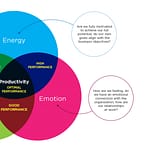On 15 July 2021, the WOW HR Global conference convened thought leaders from HR and related disciplines to discuss the future of work. There were clear themes on how the pandemic has drastically shifted the landscape of work and many of the speakers showcased how technology can be utilised to create workplaces that can support employees.
There were many fascinating speakers who presented their insights and lots to learn from, however, what stood out particularly for me was how technology can be harnessed to support making workplaces better for employees and organisations.
Ani Britt, who leads IBM’s European Talent & Transformation practice session “How artificial intelligence is reinventing HR, skills and the employee experience” was a particularly interesting one. Changes in technology means that things are moving at a faster pace, and employees will need to keep learning new skills to keep up.
Britt pointed out that “Sheep dipping” or a one size fits all approach to training is going to be a thing of the past. Instead, the future of learning will be hyper-personalised, just like Netflix. Training will be brought to employees as part of the work flow, rather than treating it as a separate experience from the workplace.
Britt also talked about the impact of technology on the hiring process. IBM hires 60k people annually. If on average, 30-40 CVs were received for each role, HR needs to go through 2.4 million CVs. What if we used AI to do the first round of screening?
Using AI can make the HR professional’s role easier as it absorbs data, analyses it, and makes a recommendation based on a hypothesis. It can therefore help HR make people related decisions. In addition to the hiring process it has the potential to support HR best practice in the workplace. AI can help surface biases. This is particularly relevant for hiring, promotion, or salary decisions and can help rectify biases before it becomes a reputational risk.
I also enjoyed the session by Jeff Schwartz, who is the author of the 2021 book Work Disrupted. He discussed how thefuture of work is largely based on fear. We worry about jobs being replaced by technology, but we can change our current perspective to a view that is much more about potential and collaboration.
Schwartz said that the pandemic period can be a launch pad to something new – like a time machine fast tracking us into the future. Things that we thought would take 5-10 years, took a mere 5-10 weeks or even 5-10 days in some cases. He talked about viewing the current situation from a lens of opportunity so we can reframe and re-design workplaces and workforces.
How we organise work has to be different now than how it was in the 20th century.
Technology has been galloping ahead for a long time, but the challenge is around the models that we use around work and careers. Quoting Albert Einstein he said, “You cannot use an old map to explore a new world.”
I found the discussions around combining people and technology in ways that go beyond substitution and automation very inspiring. Schwartz emphasised that we can create superjobs and work with technology to give humans superpowers to get the best out of them in the workplace. For instance, when spreadsheets first came into the hands of financiers, it gave people doing financial calculations superpowers which led to tremendous growth in the financial services sector – less time calculating, more time analysing, and more time developing new products and working closely with customers. Workplaces can look to technology to create superteams where most of the routine work is automated so that humans can contribute their creativity and intellect in the workplace in greater quantities and give people greater satisfaction and sense of purpose at work.
Technology + HR = Superteams. Now that’s a team I would like to be a part of! A future of work shaped by HR and technology to create engaged employees can contribute towards meaningful work that they are then rewarded for without bias.
All speakers shared cutting-edge insights, case studies, ideas and knowledge providing delegates the opportunity to learn from global thought leaders who are subject matter experts in their fields imparting additional insight into the future of work:
- Erik van Vulpen on HR competencies for 2025
- Heather Wokuschon Emotional wellbeing, mental health and resilience in the workplace
- Mimi Brooks on Building sustainable, high performance organizations of tomorrow
- Paul Gibbons on Digital age change management, behavior change, resistance and trust
Author bio: Shaheena Ormerod-Sachedina, Founder at Working Wonders
Photo credit: Owen Beard on Unsplash




